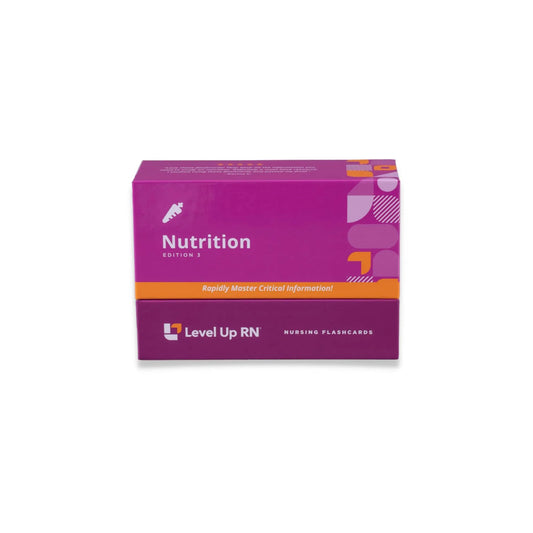Hi, I'm Cathy with Level Up RN. In this video, I will be discussing nutritional guidance for select nervous-system disorders, including neurologic dysphagia, migraine headaches, and Meniere's disease. And at the end of the video, I'm going to give you guys a quiz to test your understanding of some of the key points I'll be covering, so definitely stay tuned for that. And if you have our Level Up RN nutrition flashcards, go ahead and pull out your flashcard on nervous-system disorders so you can follow along with me.
Neurologic dysphagia is difficulty swallowing due to a neurological injury or disorder, such as Parkinson's disease or a stroke, for example. When a patient has dysphagia, it is essential to have their swallowing ability evaluated by a speech-language pathologist who could provide recommendations on the patient's diet and interventions to help the patient swallow safely. Common interventions include raising the head of the bed to an upright position during meals and having the patient remain in that upright position for 45 to 60 minutes after eating. Many patients with dysphagia will be prescribed a dysphagia diet, which includes thickened liquids as well as moist foods that are soft and/or pureed. And in many cases, having the patient tuck their chin to their chest when swallowing can help make swallowing easier and help prevent aspiration, which is where food or liquid goes into the airway. It's also important to minimize distractions during meals and have suction equipment available.
Next, let's talk very briefly about migraine headaches. This is a neurovascular disorder that causes unilateral throbbing head pain as well as nausea and vomiting and photophobia, which is increased sensitivity to light. So migraines can sometimes be triggered by certain foods, such as foods that contain monosodium glutamate, or MSG, as well as tyramines and nitrites. So avoiding or limiting these foods may help to reduce the frequency of migraines.
Lastly, let's talk about Meniere's disease, which is an inner-ear disorder that affects hearing and balance. Symptoms include tinnitus, which is ringing in the ears, vertigo, and hearing loss. Because Meniere's disease causes a buildup of fluid in the inner ear, patients are often advised to decrease their intake of salt, because increased salt intake results in water retention, which can exacerbate symptoms. Patients are also advised to distribute their fluid intake evenly throughout the day in order to eliminate changes in the fluid balance in the ear. And then finally, patients with Meniere's disease should avoid alcohol and caffeine, which can make their symptoms worse.
All right. It's quiz time. Are you guys ready? Question number one: Which interdisciplinary team member conducts a swallow evaluation for the patient?
The answer is the speech-language pathologist.
Question number two: Thickened liquids and moist, soft foods are key components of a blank diet.
The answer is dysphagia.
Question number three: Why should salt intake be restricted in a patient with Meniere's disease?
The answer is increased salt intake can cause fluid retention, which can exacerbate symptoms.
All right. That's it for this video. I hope it was helpful. Take care, and thank you so much for watching.
[BLOOPERS]
Is difficulty swallowing, doing--
Can make swallowing easier. Got it.


